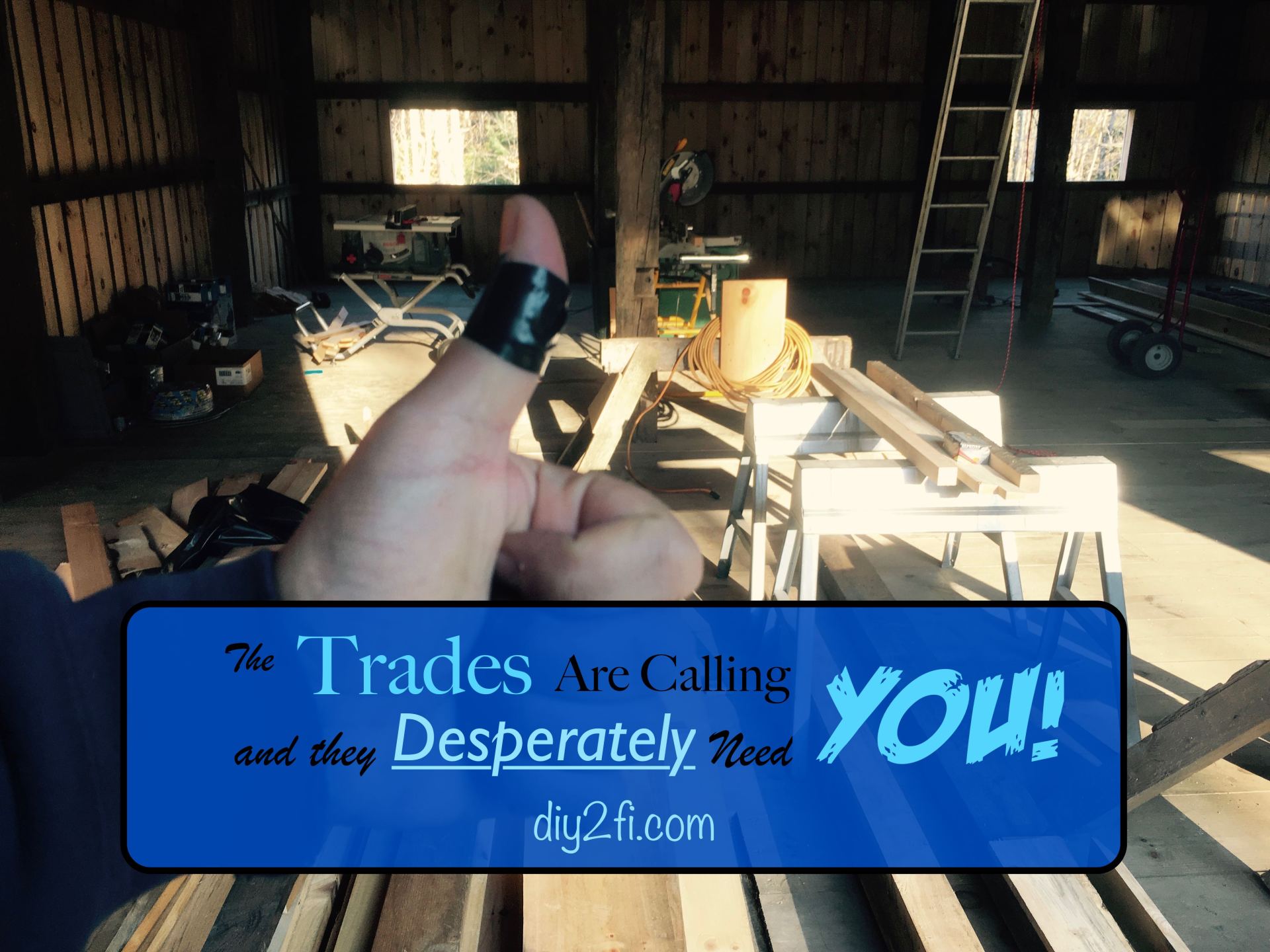The Trades Are Calling
- By Captain DIY
- •
- 06 Dec, 2018
- •
And They Desperately Need You!

Here we go again, people. You’ve read my comparison on the cost of getting educated in the trades versus going to college, you’ve heard me ramble on Choose FI
and Bigger Pockets Money
about why the trades are great, and now I’m doing it again.
Why? Because I can! Also, it’s super important!
Why? Because I can! Also, it’s super important!
Down to Brass Tacks
Here’s a sobering fact: according to the Washington Post, skilled trades have maintained the number one position in vacancies since 2010. If you have tried to hire a contractor to do some work on your house recently, you understand that fact all too well.
I have been hearing more and more lately from homeowners that they can’t get a plumber to even look at a small job, let alone come and fix it. And if you’re not on a waiting list for a roofer to come fix your roof next spring right now, you had better start making some phone calls.
Why is this? Well, there are a few reasons why the trades are filled with an aging workforce that isn’t being replaced, and I will dive into those right now.
I have been hearing more and more lately from homeowners that they can’t get a plumber to even look at a small job, let alone come and fix it. And if you’re not on a waiting list for a roofer to come fix your roof next spring right now, you had better start making some phone calls.
Why is this? Well, there are a few reasons why the trades are filled with an aging workforce that isn’t being replaced, and I will dive into those right now.
The Stigma, Oh, the Stigma!
For the last several decades, trade schools have been seen as a place for people who aren’t smart enough to go to college. Parents have pushed kids toward higher education, and kids have not shown much interest in learning a skilled trade.
I’m not going to knock college. My mother is a great example of someone who used college, mostly while being a single parent, to lift herself up to a very high level.
For those of you who are more academically oriented, college may be just the thing that gets you fired up and ready to crush the working game.
For people like me, who much prefer to learn with their hands, sitting in front of a pile of books can feel like a penitentiary sentence. Fortunately, I think we as a society are starting to recognize the value of utilizing different teaching techniques to suit the many different learning styles that people have.
Hopefully, as we start to come to grips with the fact that different people learn different ways and are suited to different types of work, the “that’s for poor dumb people” stigma will start to lift.
I’m not going to knock college. My mother is a great example of someone who used college, mostly while being a single parent, to lift herself up to a very high level.
For those of you who are more academically oriented, college may be just the thing that gets you fired up and ready to crush the working game.
For people like me, who much prefer to learn with their hands, sitting in front of a pile of books can feel like a penitentiary sentence. Fortunately, I think we as a society are starting to recognize the value of utilizing different teaching techniques to suit the many different learning styles that people have.
Hopefully, as we start to come to grips with the fact that different people learn different ways and are suited to different types of work, the “that’s for poor dumb people” stigma will start to lift.
The Fear of Instability
According to the National Association of Home Builders, the construction industry lost some 1.5 million workers between 2007 and 2009. Remember those days? I sure do. I was an apprentice electrician who had just gotten married and bought a house, and I was lucky to have a job working for a contractor who, in three generations of ownership, had never laid anyone off.
I later found out that, if a few small key jobs hadn’t pulled through, I would have been the first.
While I was incredibly lucky to make it through that tumultuous period, there were a great many who did not. And do you think all of those apprentices, who hadn’t yet gotten a license and therefore couldn’t do side jobs to pull through, were willing and able to sit around and wait for the jobs to come back? I know I wouldn’t have been, and the sour taste of a layoff that early in the game probably would have scared me off for good.
There is also a tendency in the unionized organizations to hire a bunch of workers when a big contract gets signed and then lay them off when the job is done. While this is understandable from a business perspective, it doesn’t help develop a reputation for job stability among those who are considering entering the trades. Insecurity is not a great selling point.
I later found out that, if a few small key jobs hadn’t pulled through, I would have been the first.
While I was incredibly lucky to make it through that tumultuous period, there were a great many who did not. And do you think all of those apprentices, who hadn’t yet gotten a license and therefore couldn’t do side jobs to pull through, were willing and able to sit around and wait for the jobs to come back? I know I wouldn’t have been, and the sour taste of a layoff that early in the game probably would have scared me off for good.
There is also a tendency in the unionized organizations to hire a bunch of workers when a big contract gets signed and then lay them off when the job is done. While this is understandable from a business perspective, it doesn’t help develop a reputation for job stability among those who are considering entering the trades. Insecurity is not a great selling point.

Show Me the Money
Ask around, and people will probably tell you that you won’t get rich in the trades. Sure, you’ll make a comfortable living, but you’ll do much better going into the corporate world.
It’s true that you don’t hear of whole hordes of millionaires streaming from the ranks of construction workers and laborers. But the Bureau of Labor Statistics reports the median annual wage for electricians to be $52,720. That’s median, meaning there are lots of folks making more than that. There are plenty making less than that as well, but the pay tends to be directly reflective of the Cost of Living in the area. In other words, an electrician making less than that is probably living and working in an area that doesn’t cost a whole lot. The highest 10% of electricians are pulling in more than $90k!
There are, as I’ve gone on at length about in the past, many other options for expanding income in the trades. The potential for side jobs is enormous, and all it takes to be prepared is the tools you already own for your day job and some business insurance. For reference, I have a $2,000,000 coverage plan that costs me around $700 per year.
It’s true that you don’t hear of whole hordes of millionaires streaming from the ranks of construction workers and laborers. But the Bureau of Labor Statistics reports the median annual wage for electricians to be $52,720. That’s median, meaning there are lots of folks making more than that. There are plenty making less than that as well, but the pay tends to be directly reflective of the Cost of Living in the area. In other words, an electrician making less than that is probably living and working in an area that doesn’t cost a whole lot. The highest 10% of electricians are pulling in more than $90k!
There are, as I’ve gone on at length about in the past, many other options for expanding income in the trades. The potential for side jobs is enormous, and all it takes to be prepared is the tools you already own for your day job and some business insurance. For reference, I have a $2,000,000 coverage plan that costs me around $700 per year.
What Can We Do?
The most important thing is that the crisis is being recognized. Michigan governor recently announced an ambitious $100 million dollar plan to reconstruct the way the state prepares its young people for the workforce. It’s a good start, but this needs to be happening all over the country.
Real growth and change for a country comes from small pockets of people all around it, and this is where we come in. It’s time for us to talk to our children, nieces and nephews, and any young people in our circle about the benefits of a career in the trades.
In the Financial Independence community, we talk a lot about finding the best investment strategy. Discovering the next big thing might not be a safe option for most of us, but in this case we have an option to get in on the ground level, so to speak, of an industry with huge growth slated for the near future.
Now is the best time in generations to get into the trades, as companies are starting to offer more attractive benefits packages to lure in skilled workers. Develop those skills, and you may find yourself on the right side of the bargaining table.
Real growth and change for a country comes from small pockets of people all around it, and this is where we come in. It’s time for us to talk to our children, nieces and nephews, and any young people in our circle about the benefits of a career in the trades.
In the Financial Independence community, we talk a lot about finding the best investment strategy. Discovering the next big thing might not be a safe option for most of us, but in this case we have an option to get in on the ground level, so to speak, of an industry with huge growth slated for the near future.
Now is the best time in generations to get into the trades, as companies are starting to offer more attractive benefits packages to lure in skilled workers. Develop those skills, and you may find yourself on the right side of the bargaining table.
Final Thoughts
I realize this article is a bit of a serious one, and I apologize for that, but this is a message that really needs to be spread. There is great opportunity out there, and the path to FI can take many forms. If a career in the trades isn’t for you, that’s absolutely fine. But maybe there is someone out there that you know that could benefit from hearing about this. Pass it on!
In order to lighten the mood and give you more incentive to share this article, I shall now end it with some hilarious electrician jokes.
In order to lighten the mood and give you more incentive to share this article, I shall now end it with some hilarious electrician jokes.
Why didn’t the electrician ask for a second date?
He didn’t feel a spark.What kind of car does an electrician drive?
A Volts-wagon